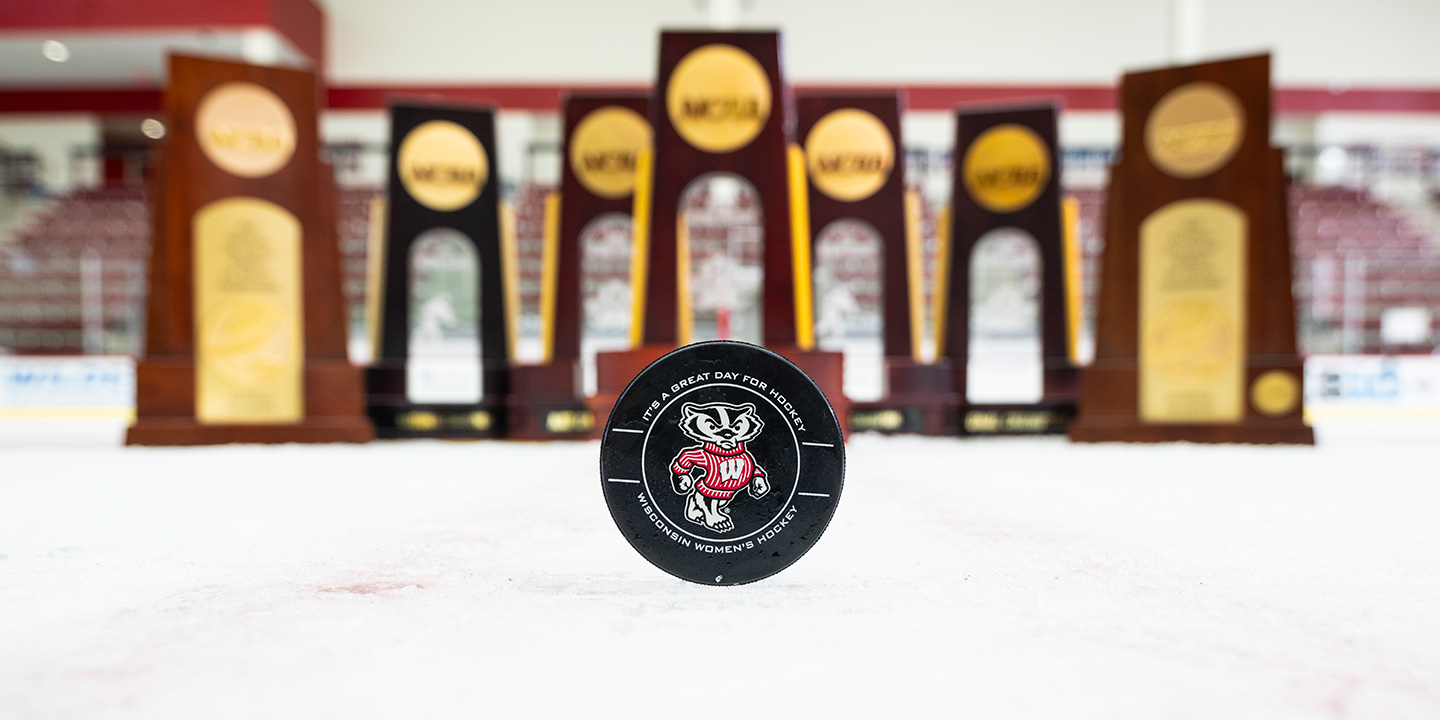
Dynasty
UW women’s hockey makes history, again and again.
The University of Wisconsin–Madison women’s hockey team wins. A lot.
On March 19, 2023, they shut out the Ohio State Buckeyes to secure the program’s seventh national championship, breaking the UW’s tie with the University of Minnesota to become the most decorated college women’s hockey program in the country. The 2023 trophy was the latest addition to a legacy lined with nine conference championships, five Patty Kazmaier Memorial Awards, four National Coach of the Year awards, countless individual player accolades, and 24 consecutive winning seasons (and counting).
Does winning ever get old? “No,” says, well, everyone. It’s an integral part of the tightly knit fabric of the Badger women’s hockey community — but it isn’t the sole thread that holds it together.
Winning is a tradition that UW women’s hockey has celebrated in every year of its existence and one that its alumnae continue well into their professional careers. Another tenet to which they remain just as fiercely dedicated is ensuring that future players have the same opportunities, if not more, to share in that tradition of victory. The program has a legacy of committed coaches who turn fierce competitors into consistently elite teams and a roster of women who will go down in hockey history.
Fresh Ice
This year marks the 25th anniversary of women’s hockey as an official program of UW athletics, but female Badgers have been lacing their skates and taping their sticks for nearly half a century.
In 1973, Marianne (Anderson) Larson, Jill Steinberg, and Karen Schwarz founded the UW Women’s Hockey Club as a haven for female students seeking ice time and a team to share it with. The previous year, the United States had passed Title IX, prohibiting sex-based discrimination in education activities and programs receiving federal funds, but it would be 25 more years before the UW–Madison Athletic Board added women’s ice hockey to the intercollegiate athletic program; the Western Collegiate Hockey Association (WCHA) didn’t add the women’s competition until the 1999–2000 season.
On July 9, 1998, Julie Sasner, then the head coach of the women’s hockey team at Cornell University, was announced as the first head coach of the Wisconsin women’s hockey program. She arrived on campus with her first recruit, Jackie MacMillan ’03, and set to work building a team.
“Our plan is to compete for a national championship within five years,” Sasner said at the outset of the first season. “We want to build a program that will consistently compete with the very top teams in the nation year after year.”
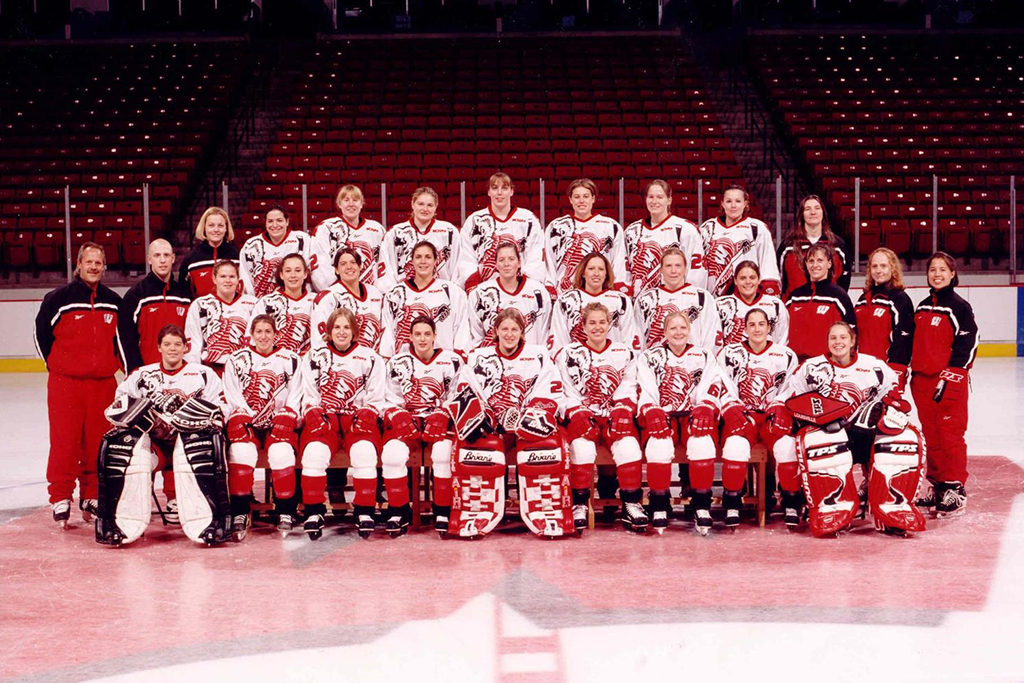
The first UW women’s hockey team in 1999. Courtesy of UW Athletics
On October 8, 1999, the Badgers played their first game against Minnesota–Duluth in the Kohl Center in front of nearly 4,000 fans, including then-governor Tommy Thompson ’63, JD’66 and members of the 1998 U.S. Olympic women’s ice hockey team, which won the event’s first gold medal during its Olympic debut. The Badgers finished their first season 19–14–2 overall and 15–8–1 in the WCHA, placing third in the regular season.
Sasner left the UW after just one season and was succeeded by her assistant coach, Trina Bourget. Bourget led the Badgers to another third-place finish in 2000–01 and a tie for second in 2001–02 before also taking her leave. The young women’s hockey program needed stability in its leadership to match the strong performance from its players. They didn’t have to go far to find it.
Miracle Coach
Mark Johnson ’94 didn’t need an introduction when he took over the role of head women’s hockey coach in 2002. He’d spent the previous six years as an assistant coach with the UW men’s hockey program, for which he’d played from 1976 to 1979. Prior to coaching, Johnson enjoyed a successful 11-year career with the National Hockey League (NHL). Before the NHL, he helped the U.S. men’s national hockey team win a gold medal during the 1980 Winter Olympics, which included the historic “Miracle on Ice” game against the Soviet Union (later memorialized in the 2004 film Miracle).
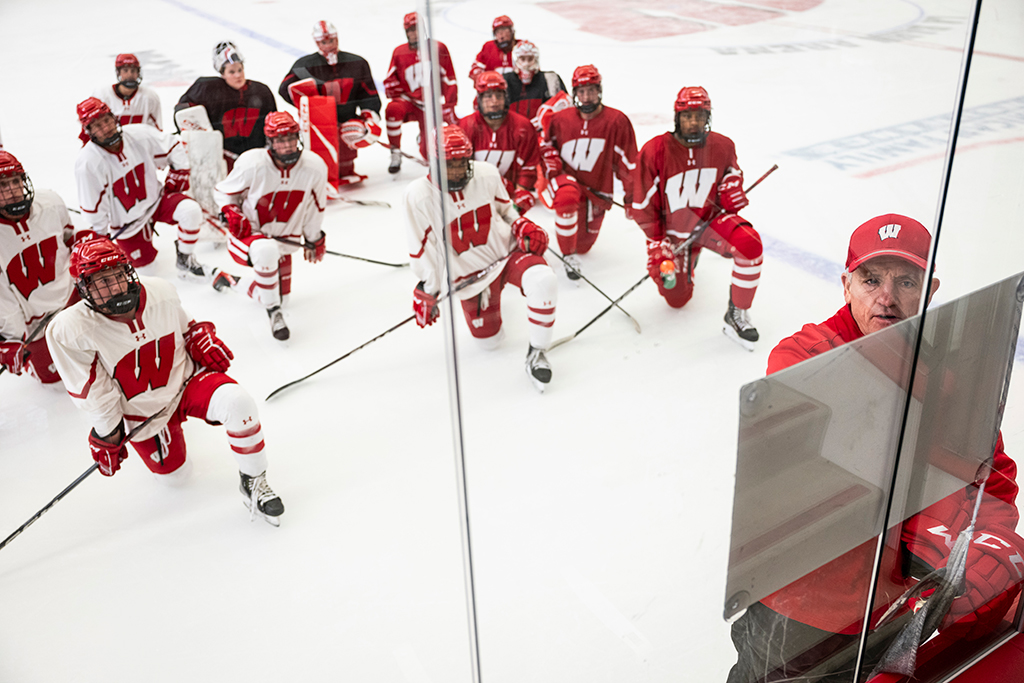
Trust is a foundational pillar of Mark Johnson’s coaching strategy. Jeff Miller
And before he was Mark Johnson of Miracle fame, he was Mark Johnson, son of “Badger Bob” Johnson, the legendary UW men’s hockey coach from 1966 to 1982 who led the program to its first three national titles, one of which his freshman son helped win in 1977.
“I had a pretty good mentor,” Johnson says.
Badger Bob was also one of the earliest advocates for UW women’s hockey. He welcomed the athletes of the Women’s Hockey Club onto the ice after his team’s games in the Dane County Coliseum and secured interview spots for the women during radio broadcasts of the men’s games. His iconic phrase, “It’s a great day for hockey,” graces the western wall of LaBahn Arena, where his son now coaches the country’s most successful college women’s hockey program.
But before he, too, could be a great coach, the younger Johnson had to be a novice. His first head coaching gig marked his first experience coaching female athletes. The technical learning curve was minimal — “Hockey’s hockey,” he says — but he was quick to pick up on his new team’s desire to understand the purpose behind the directions he issued. This was an exciting environment for a coach who considers himself more of a teacher.
“If you like to teach and you have the pupil in front of you that’s willing to [listen and work], then it becomes a great relationship,” he says.
A coaching staff with a keen eye for raw talent means that Johnson only needs to use a light touch when honing his pupils’ skills.
“They look after one another, they take care of one another, they trust one another, and when they get on the ice, you can see it.”
— Mark Johnson
“He’s a very hands-off coach,” says Abby Roque ’20, a Kazmaier Award finalist and WCHA Rookie of the Year and Player of the Year. She played for Johnson until her senior season was cut short by the pandemic in 2020. “He’ll let you play your game and give you the resources and the practices to get better.”
Hilary Knight ’12, who played in four NCAA championships with the Badgers and holds 12 program records, recalls a game during which she found herself shying away from shots after missing one in the previous period. When Johnson questioned her about the worst possible outcome of taking another chance, she was first skeptical, then stumped.
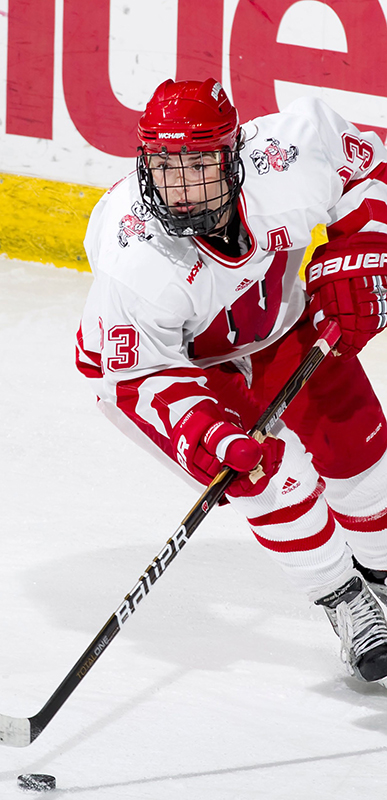
Knight: “You leave the UW wanting to change the world.” Ross Ladue
“You miss?” she guessed.
“Well, if that’s the worst thing that can happen, go out there and take your shot.”
“It was that simple,” Knight says. “Obviously, the expectation is to score, but knowing that he’s got all the confidence in the world in your capabilities … it’s just incredible.”
This instance is emblematic of one of the foundational pillars of Johnson’s coaching philosophy: trust. In return for the dedication and “trust in the process” that he expects of Badger women’s hockey players, Johnson trusts them in return to put their talent and intuition to good use on the ice.
“He is always going to get the best out of players because of this mutual respect,” Knight says. “You’re going to show up, you’re going to play, and he’s going to let you instill your own creativity in the game.”
Trust also helps turn individual players into loyal teammates.
“Once they have ownership of their team, then they’re going to play at a higher level,” Johnson says. “They look after one another, they take care of one another, they trust one another, and when they get on the ice, you can see it.”
With Johnson at the helm, reaching this higher level didn’t take long. The Badgers first qualified for the NCAA tournament during the 2004–05 season. The following year, they claimed their first WCHA regular-season, playoff, and NCAA championship titles and defended all three in 2006–07. (The UW men’s hockey team also won the NCAA championship in 2006, making the UW the first — and so far only — school to win an NCAA national title in both men’s and women’s hockey in the same season.)
Between 2008 and 2012, the team went on to compete in four NCAA championships under Johnson, winning two. (He took a brief hiatus during the 2009–10 season to coach the U.S. Olympic women’s team to a silver medal.) The years since have brought five more first-place finishes in the WCHA and three more national titles. At this point in a gilded career as both a player and a coach, it begs the question: is there anything better than winning?
“Wins are fun, and it’s much better to win than lose, but when you see kids develop and then reach some of their goals that they set, that’s why we’re in the business,” Johnson says. “Are you learning life lessons as you go through your process? As we give them the diploma, are we equipping them with tools to be successful wherever they end up?”
A brief glance at the professional careers of several Badger hockey alumnae suggests that even in this respect, UW women’s hockey can claim victory.
Beyond LaBahn
“If I didn’t go to Wisconsin, I would not be who I am today, where I am today,” says Knight.
Anyone familiar with the 34-year-old hockey star’s résumé will understand just how much of a testament this is to her alma mater. She’s a four-time Olympian and a gold medalist who made her Olympic debut under Johnson in 2010. She’s competed in 13 International Ice Hockey Federation (IIHF) world championships with Team USA, taking home gold in nine. She led the Boston Blades of the now-defunct Canadian Women’s Hockey League to a Clarkson Cup victory in 2013 and later helped the Boston Pride of the National Women’s Hockey League (now the Premier Hockey Federation) win the first-ever Isobel Cup. This year, she received the first IIHF Female Player of the Year Award.
“Hockey is going to be taken to the next level and it’s going to be on the backs of women.”
— Hilary Knight
But perhaps Knight’s proudest achievement is the work she’s put in off the ice to give back to the game she loves. In 2017, Knight and her teammates on Team USA, including captain and fellow Badger Meghan Duggan ’11, threatened to boycott the IIHF women’s world championship in response to stalled negotiations over equitable pay. She’s an executive committee member of the Professional Women’s Hockey Players Association, a nonprofit organization created in 2019 in response to dissatisfaction with compensation and operations in the Premier Hockey Federation. When she’s not working on her own game or investing in its future, she’s also an NHL analyst with ESPN.
“You leave the UW wanting to change the world,” Knight says. “You want everybody to have that greatness of experience.”
Knight is one of many UW hockey alumnae who continue to make history and forge new opportunities for pee-wee players and professionals alike. Duggan — a Kazmaier Award winner, three-time Olympian, two-time Team USA captain, and gold medalist — is the first director of player development for the NHL’s New Jersey Devils. She’s also the president of the Women’s Sports Foundation, an organization founded by tennis player Billie Jean King in 1974 to promote female involvement in sports. Back in the Midwest, Meghan Hunter ’05 — one of the Badgers’ earliest recruits and a Kazmaier Award finalist — is the assistant general manager of the Chicago Blackhawks.
Sarah Nurse ’18, an Olympic gold medalist and two-time world champion with Team Canada, became the first woman to feature on the front of an EA Sports NHL video game when she donned her Canadian sweater on the cover of NHL 23. She’s also a vocal advocate for inclusivity in hockey. After her 2022 Olympic win, she partnered with CCM Hockey to launch a limited-edition stick with sales benefiting Hockey 4 Youth, a nonprofit that promotes access to hockey for burgeoning young players and immigrants to Canada.
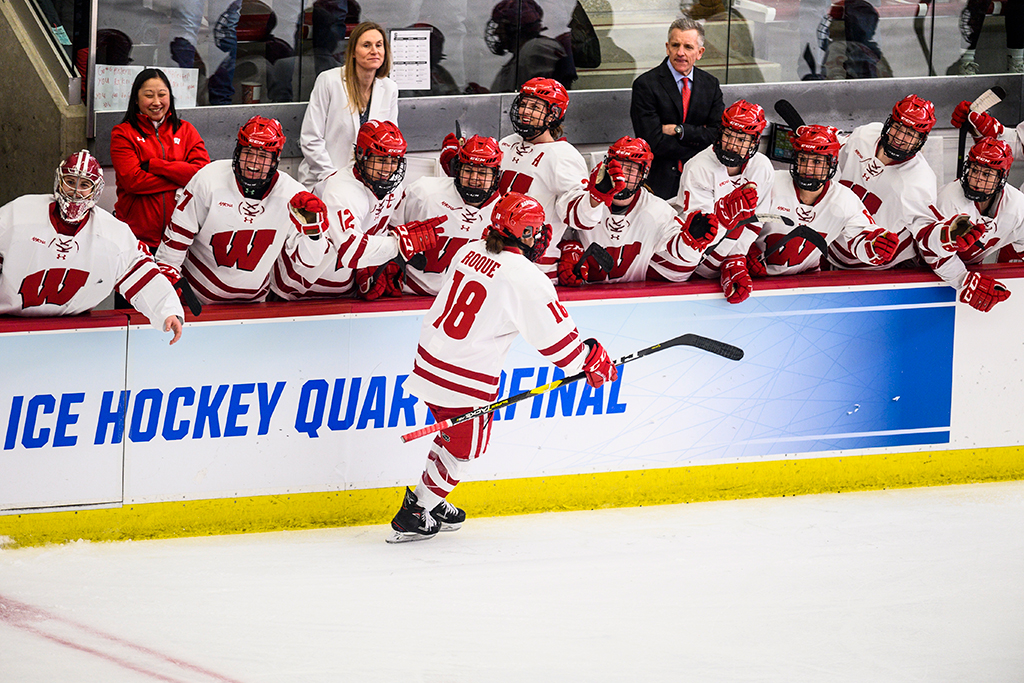
Abby Roque became the first Indigenous woman to compete in Olympic ice hockey for Team USA. Jeff Miller
And Roque, a world champion and member of the Wahnapitae First Nation, became the first Indigenous woman to compete in Olympic ice hockey for Team USA during the Beijing games in 2022. She hosts a hockey camp in her hometown of Sault Sainte Marie, Michigan, to provide young people in her community, which boasts a prominent Indigenous population, opportunities to learn the game and hone their skills.
“Hockey is going to be taken to the next level,” Knight says, “and it’s going to be on the backs of women.”
A League of Their Own
Many UW hockey alumnae were among the few girls — if not the only girl — on an all-boys team in their childhood hockey leagues. Roque spent her high school career getting ready in first-aid closets and public restrooms while her male teammates enjoyed the luxury of a locker room. When MacMillan arrived on campus in 1998, she practiced with the men’s team for a year while the women’s program laced up its skates. The NHL may favor UW hockey alumnae in its administrative ranks, but not on their all-male rosters. That’s just fine — women’s hockey needs a league of its own.
This past August, just as collegiate athletes returned to campus and geared up for their seasons, the newly formed Professional Women’s Hockey League (PWHL) announced its six founding franchises in Boston, New York, Minneapolis/Saint Paul, Toronto, Montreal, and Ottawa (coached by UW hockey alumna Carla MacLeod ’06). Each team began building its roster during a predraft, free-agency period, and UW women’s hockey is well represented among the PWHL’s inaugural class: Nurse and Blayre Turnbull ’15 (Toronto), Emily Clark ’19 (Ottawa), Ann-Renée Desbiens ’17, MAcc’19 (Montreal), Roque (New York), and Knight (Boston).
On September 18, the first draft of the PWHL saw seven more Badgers enter the professional ranks. Kristen Campbell ’20, Jesse Compher MS’23, and Mellissa Channell ’17 joined Nurse and Turnbull in Toronto. Natalie Buchbinder ’23 and Sophia (Shaver) Kunin ’19 will play for Minneapolis/Saint Paul. Daryl Watts ’22 will play for MacLeod in Ottawa, and Sophie Shirley ’23 was drafted by Boston.
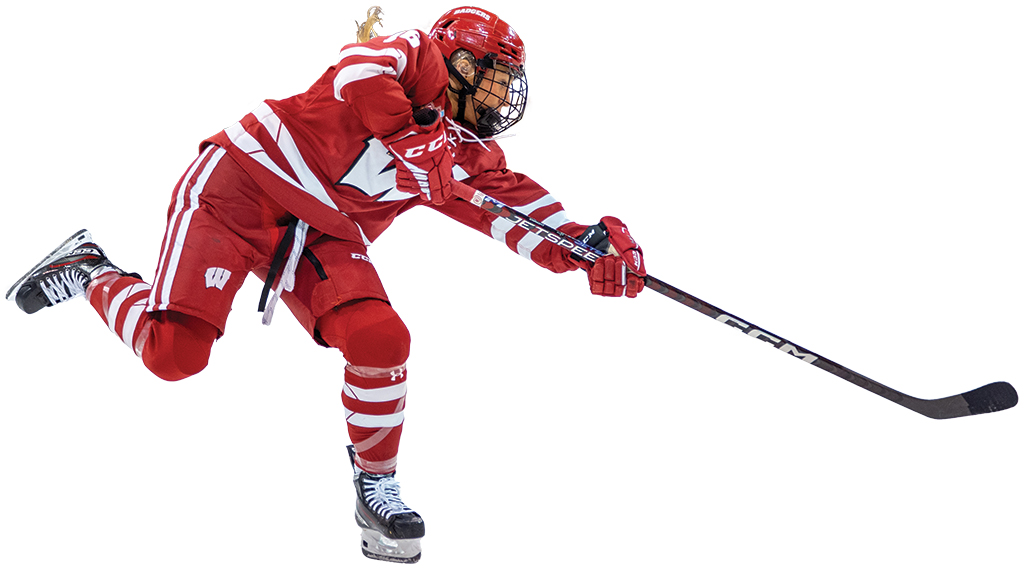
Forward Claire Enright x’27 during the 2023 NCAA championship game. Meg Kelly
“We [built] this for ourselves, but it’s going to be so much greater when this younger generation gets up to the pro level,” Roque says. “I’ve had so many little girls already say to me that they always wanted to be an Olympian, but now there’s a real pro league, too. They can really play.”
Even after they’ve moved on to next-level leagues and new careers, Wisconsin women’s hockey players keep a close eye on LaBahn, where the trophy case is heavy with hard-earned hardware and the team is stacked with upstanding individuals who will join them in making history both on and off the ice.
“Anyone who’s an alum [of the program] has pride in it,” says assistant coach and UW hockey alumna Jackie (Friesen) Crum ’06. “When we win or we lose, I still get messages from former players about how excited they are, saying ‘Hey, we’re watching.’ ”
With a legacy like this, who wouldn’t be? •
Megan Provost ’20 is a staff writer for On Wisconsin.
Published in the Winter 2023 issue
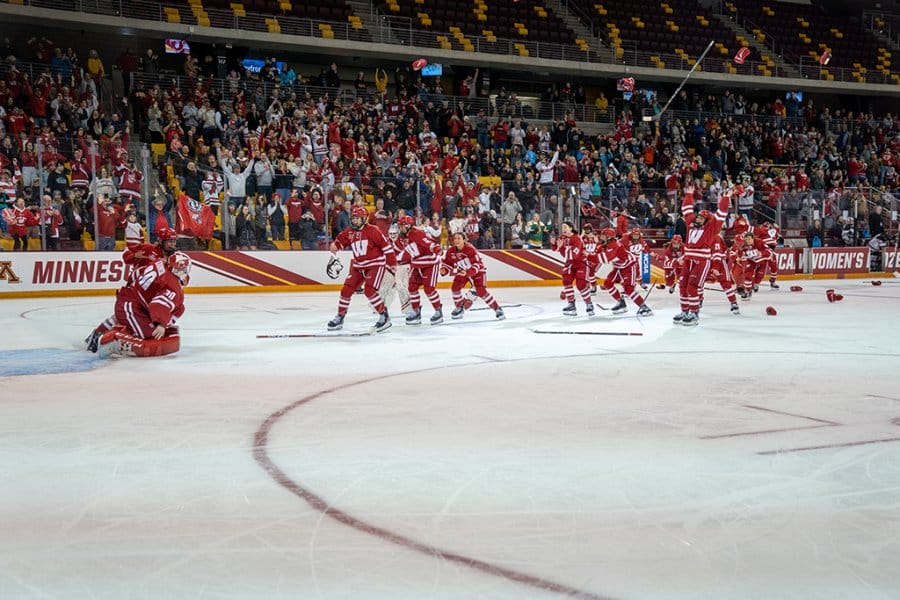
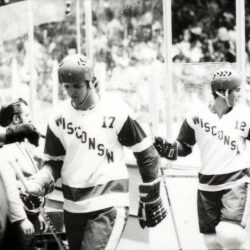
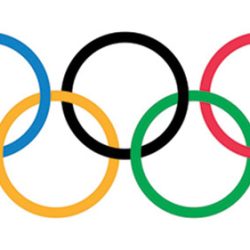
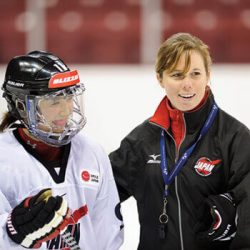
Comments
Karen Schwarz November 14, 2023
Thank you very much for a great article on the history of women’s hockey at UW! It has been a terrific 25 years for the varsity program. I also have many wonderful memories as a co-founder of the Club team and playing with them for many years. Thank you for mentioning our names! Many of us from the early years are still in contact with each other. We also enjoy how the Varsity team has performed over the years. Thank you Mark Johnson!